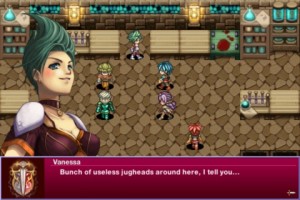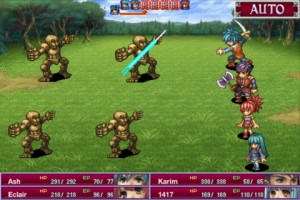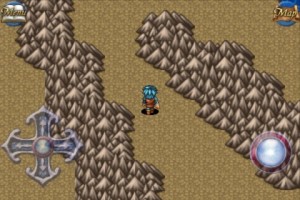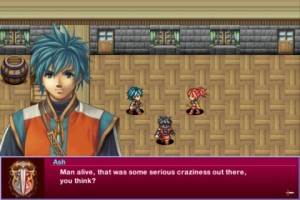All hell breaks loose in the frontier village of Heiland when Ash, a well-intentioned sentry, offers shelter to a runaway royal and her bodyguard. As one might expect, our spiky haired hero gets swept up in anti-Imperial politics, swashbuckles sea monsters, and gets to ride an airship together with his ragtag cadre. Alphadia (Out Now, $2.99 Sale), the latest JRPG ported to iOS by Kemco, seems all too predictable at first. Give it some time, however, and you’ll find there’s a more impressive story under the hood than you may suspect! Playing this one right after Symphony of Eternity was quite the interesting experience. I came away with the impression that a perfect JRPG had been split down the center, with the interesting story, attractive presentation, and overall polish going to Alphadia, while Symphony came away with the deeper gameplay.
 Alphadia’s plot carries a key ingredient that Symphony’s lacked: a series of interesting mysteries that string the player along while they’re gradually unraveled. It seems as if the script tips its hand a little too liberally in the first hour, but the payoffs are still surprising and had me genuinely raising my eyebrows — no mean feat for as jaded an RPG fan as I’ve become over the years! Ash is too much the naive, goody-two-shoes hero to be interesting in his own right, but his party runs into a satisfyingly sordid cast of NPCs who manage to hold the entire show together.
Alphadia’s plot carries a key ingredient that Symphony’s lacked: a series of interesting mysteries that string the player along while they’re gradually unraveled. It seems as if the script tips its hand a little too liberally in the first hour, but the payoffs are still surprising and had me genuinely raising my eyebrows — no mean feat for as jaded an RPG fan as I’ve become over the years! Ash is too much the naive, goody-two-shoes hero to be interesting in his own right, but his party runs into a satisfyingly sordid cast of NPCs who manage to hold the entire show together.
It helps that Alphadia received a downright excellent translation! At times the translators reach a little too far in their goal of making Alphadia’s characters speak naturally, but they hit their mark more often than not. Alphadia’s script isn’t quite on par with the likes of SRRN Games’ natively English Ash, but I am quite comfortable calling it the best out of all the translated scripts I’ve seen so far on iOS. Updates could still iron out a few misspellings though.
 While Alphadia’s story managed to reel me in, its random battles turned me off. As much as I wanted to lash into Symphony yesterday for its itsy-bitsy sprites and claustrophobic corridors, I had to respect the fact that the player could see and avoid enemies there. I could forgive the forced encounters in Alphadia if there were anything creative to look forward to in battle, but sadly it’s little different from what we’ve been doing since the original Final Fantasy; a one-off swipe or spell per character turn is as exciting as it gets here. Mercifully, the game offers a handy “Auto” button that lets the computer do what the player normally would during regular battles: hammer on that “Attack” option to finish things as quickly as possible, reserving items and spells for bosses. Automatically fought battles last mere seconds, making the encounter rate bearable.
While Alphadia’s story managed to reel me in, its random battles turned me off. As much as I wanted to lash into Symphony yesterday for its itsy-bitsy sprites and claustrophobic corridors, I had to respect the fact that the player could see and avoid enemies there. I could forgive the forced encounters in Alphadia if there were anything creative to look forward to in battle, but sadly it’s little different from what we’ve been doing since the original Final Fantasy; a one-off swipe or spell per character turn is as exciting as it gets here. Mercifully, the game offers a handy “Auto” button that lets the computer do what the player normally would during regular battles: hammer on that “Attack” option to finish things as quickly as possible, reserving items and spells for bosses. Automatically fought battles last mere seconds, making the encounter rate bearable.
It’s worth noting that Alphadia gives the player a bit of control over character development: each of the heroes has one native elemental affiliation but may learn spells of other elements if the player equips him or her with certain accessories. This feature appears at about the same time the story starts getting good. Nor is grinding much of a concern because experience points are lathered onto the party at a comfortable rate. Gold is another matter, but the difficulty curve does a great job of taking the player’s cash-strapped status into account. Discerning JRPG fans will also appreciate that sidelined characters level up right along with the active party, and are penalized only in terms of spell learning.
 Alphadia’s environment design feels pretty basic; there’s not much in the way of dungeon puzzles or items shoved in barrels. The occasional far-flung treasure chest does await the player who puts effort into exploring the game’s towns and dungeons. Speaking with minor NPCs lets the player rack up lots of side quests, which are listed alongside story quests in the menu system. The player doesn’t have a world map at first, but don’t panic — it gets activated in the game’s first dungeon. Area minimaps, on the other hand, aren’t on offer.
Alphadia’s environment design feels pretty basic; there’s not much in the way of dungeon puzzles or items shoved in barrels. The occasional far-flung treasure chest does await the player who puts effort into exploring the game’s towns and dungeons. Speaking with minor NPCs lets the player rack up lots of side quests, which are listed alongside story quests in the menu system. The player doesn’t have a world map at first, but don’t panic — it gets activated in the game’s first dungeon. Area minimaps, on the other hand, aren’t on offer.
Like Symphony before it, Alphadia has a manual save-anywhere system, although a backup auto-save kicks in at certain points to salvage some of the player’s progress in case he or she forgets to use it before exiting. Alphadia’s interface turned out far superior to Symphony’s. Even thinly highlighted dialogue choices can be picked off reliably, which speaks volumes for the care taken in the touch sensitivity department here.
 Wonderful full-body character portraits are Alphadia’s standout aesthetic asset. While the game’s sprites are big and well-rendered in screenshots, they leave much to be desired in motion; character animations top out at a mere two frames. Yikes! Environments are likewise strung together from noticeably limited tile sets. No doubt graphics storage space was a major concern on whatever platform Alphadia was originally created for, but let’s hope the developer puts more resources into future ports from this series. Players can look forward to a meaty quest that clocks in over twenty hours, even with that handy “Auto” battle function turned on.
Wonderful full-body character portraits are Alphadia’s standout aesthetic asset. While the game’s sprites are big and well-rendered in screenshots, they leave much to be desired in motion; character animations top out at a mere two frames. Yikes! Environments are likewise strung together from noticeably limited tile sets. No doubt graphics storage space was a major concern on whatever platform Alphadia was originally created for, but let’s hope the developer puts more resources into future ports from this series. Players can look forward to a meaty quest that clocks in over twenty hours, even with that handy “Auto” battle function turned on.
iFanzine Verdict: Alphadia’s approach to RPG gameplay is too conservative to reach across genre boundaries, but JRPG traditionalists who don’t mind random battles or basic turn-based combat have plenty to look forward to in its lengthy story and overall level of polish.


